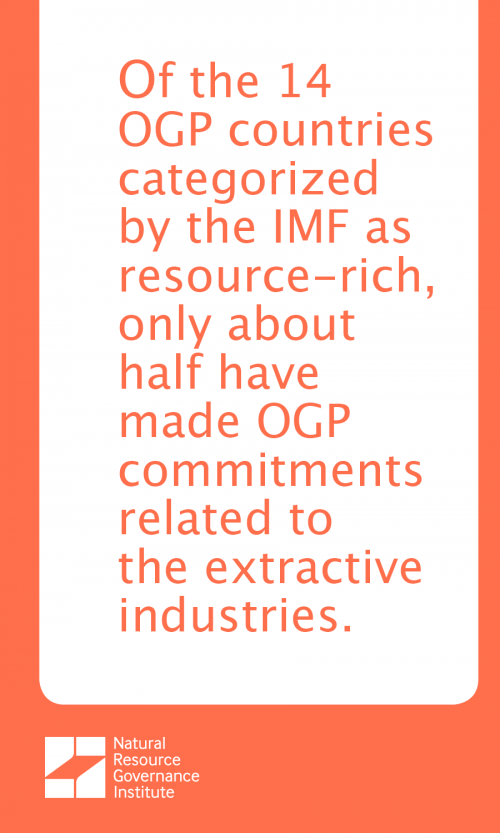This week’s U.S.-Africa Leaders Summit and surrounding events have engaged leaders, civil society representatives, and business people from 50 African countries in a number of key initiatives and dialogues in Washington. Not just across countries, but also within them, such multi-stakeholder forums can build the trust and understanding between government, civil society and the private sector that is necessary if natural resource governance is to be improved. By leveraging complementary forums—such as the Open Government Partnership (OGP) and the Extractive Industries Transparency Initiative (EITI)—opportunities for policy improvements can increase even further.
It was this goal that motivated a meeting of the OGP and EITI in the lead-up to the recent EITI International Board meeting in Mexico City. The meeting focused on strengthening linkages, sharing lessons learned, and addressing mutual concerns between the two initiatives. While some resource-rich countries have incorporated EITI commitments into their OGP national action plans, there is still considerable room for further collaboration.
For example, of the 14 OGP countries that the IMF categorizes as resource-rich, only about half have made OGP commitments related to the extractive industries. African states comprise half of the 46 countries implementing EITI, and yet, their participation in OGP is much lower—just eight of 64 participating countries hail from Africa. On Monday, this week’s Washington summit included an OGP meeting that emphasized further outreach and uptake.
The Natural Resource Governance Institute (NRGI) is part of the leadership of both initiatives, serving on the EITI International Board and as the Civil Society Co-Chair on the OGP Steering CommitteeThe Steering Committee is OGP’s executive decision-making body. Its role is to develop, promote and safeguard OGP’s values, principles and interests; establish OGP’s core ideas, policies, and ru.... The meeting—hosted jointly by the EITI, OGP and NRGI—convened more than 20 participants, and included presentations from NRGI president Daniel Kaufmann, Jonas Moberg of the EITI International Secretariat, Bob Cekuta of the Bureau of EnergyEnsuring universal access to sustainable, dependable, and affordable energy is critical to every aspect of prosperity. Increasing public oversight and transparency in the energy sector can help to ens... More Resources at U. S. Department of State, and Aroa de la Fuente of Fundar.
Not surprisingly, opportunities for synergy abound. Participants at the meeting identified several such areas—sustaining political will, creating incentives, ensuring strong and meaningful civil society engagement, codifying internal governance, and promoting electronic data and other innovations.
One of the tools that informed our discussion was an analysis of 27 countries participating in both OGP and EITI. While OGP aims to secure concrete commitments from governments to promote transparencyAccording to OGP’s Articles of Governance, transparency occurs when “government-held information (including on activities and decisions) is open, comprehensive, timely, freely available to the pub... More, empower citizens, fight corruption, and harness new technologies to strengthen governance, EITI has a sector-specific mandate—to improve openness and accountability within the extractive industriesApplying open government values of transparency, participation, and accountability to extractive industries can decrease corruption, safeguard community interests and needs, and support environmental .... The analysis looked at successes and opportunities to date with building country-level linkages between both initiatives.
For example, Tanzania’ second OGP action planAction plans are at the core of a government’s participation in OGP. They are the product of a co-creation process in which government and civil society jointly develop commitments to open governmen... prioritizes extractive industries transparency, and includes linkages to fulfilling the country’s EITI commitments, such as publishing contracts —and now it’s time to honor those commitments. Collaboration using both OGP and EITI as tools can help.
Finally, the discussion also touched on the work of the Openness in the Natural Resources Working Group, an OGP mechanism we lead with the governments of Ghana and Indonesia, and the World Resources Institute. This working group supports and inspires governments to design and implement natural resource-focused commitments that are concrete, impactful, ambitious and targeted—a potentially useful platform for supporting EITI outreach and implementation.
The conversation in Mexico City served as a forum for sharing experiences and commitmentOGP commitments are promises for reform co-created by governments and civil society and submitted as part of an action plan. Commitments typically include a description of the problem, concrete action..., just like this week’s U.S. Africa Leaders Summit. Now is the time for countries in Africa, who have been leaders in EITI, to share and apply their experience within the OGP context in order to maximize the potential impacts of these initiatives.
Erica Westenberg is NRGI’s EITI policy officer.

